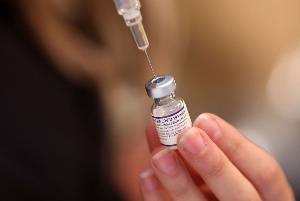Health News of Wednesday, 21 May 2025
Source: www.ghanawebbers.com
World-first gonorrhoea vaccine launched by NHS England as infections soar
England will be the first country to vaccinate against gonorrhoea.
The vaccine will not be available to everyone. It will mainly target gay and bisexual men with multiple sexual partners or STIs.
The vaccine is 30-40% effective. NHS England hopes it will reduce rising infection rates.
In 2023, there were over 85,000 cases, the highest since 1918.
Gonorrhoea often has no symptoms but can cause pain and infertility.
It’s uncertain how many people will choose to get vaccinated.
Projections from Imperial College London suggest that if popular, the jab could prevent 100,000 cases. This could save the NHS nearly £8 million over ten years.
Max, a sexual health campaigner, said he would "100%" take the vaccine after having gonorrhoea twice in one year.
He believes this announcement is great news and will relieve pressure on clinics.
Vaccination starts in August through sexual health services.
Public Health Scotland is also planning a program for high-risk individuals.
BBC Newsbeat has asked Wales and Northern Ireland about their plans for vaccination.
Is the vaccine effective enough?
This vaccine was originally designed for meningitis B in babies.
However, it appears to reduce gonorrhoea cases by about one-third due to similarities between the bacteria.
Health clinics must communicate that this vaccine does not eliminate all risks of gonorrhoea transmission during unprotected sex.
Prof Andrew Pollard from JCVI stated that despite its limited effectiveness, it is still "worth having" and could have a significant impact overall.
The decision addresses record case numbers and increasing treatment difficulties for gonorrhoea.
Most cases are treated with antibiotics, but resistance has been evolving for 80 years.
Current treatments are also facing resistance issues, raising concerns about untreatable infections in the future.
Preventing infection is crucial for managing drug-resistant strains.
Dr Amanda Doyle from NHS England called this vaccination launch a major advancement in sexual health protection.
It aims to help prevent infections and combat antibiotic-resistant strains of bacteria.
Those most affected by gonorrhoea include individuals aged 16-25, gay and bisexual men, and those of black or Caribbean ancestry.
The vaccine costs around £8 per dose and offers good value when targeting high-risk groups rather than all teenagers.
Clinicians can use their judgment to offer vaccines to other high-risk patients as needed.
People may receive mpox (formerly monkeypox), HPV, and hepatitis vaccines at the same time as well.
Prof Matt Phillips from the British Association for Sexual Health called this news excellent and a landmark moment for sexual health in England.
With diagnoses at record highs, this initiative could help reverse trends.
It remains unclear how long protection lasts or how often boosters may be needed.
This decision follows nearly a year-and-a-half after JCVI recommended a vaccination program.
Sexual health advocates criticized the delay but welcomed this decision as a significant victory.
Katie Clark from Terrance Higgins Trust described it as a "huge win."











